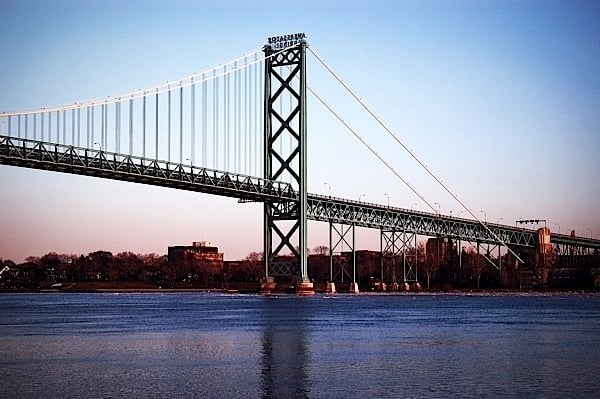The trucking industry is calling it both a “green light” and a “diplomatic failure,” but the long-delayed, badly needed bridge between Windsor and Detroit can now proceed. Canada’s Minister of Transport, Lisa Raitt, signed an “Arrangement” to proceed with the Detroit River International Crossing (DRIC) without further delay. One of the terms of that agreement is that Canada will pay for the new US customs plaza to be built on the Detroit side. This is expected to cost about $300 million, and Canada had been fighting to have Washington pay for it. Washington refused, and that is the part of the deal that Today’s Trucking called a diplomatic failure. Canada is already paying for the entire cost of building the bridge, even including a new road link between the bridge and US Interstate 75 in Michigan. The total cost is projected to be more than $2 billion.
The terms of the Arrangement state that the US inspection plaza is procured as part of the “public-private partnership” that will design, build and finance the entire project. The cost of the US port of entry will be repaid from future toll revenues, “and not by Canadian taxpayers,” according to Raitt. Washington’s only obligation is to staff and operate the new customs plaza.

In a statement, Raitt said that the bridge “will facilitate the movement of people, goods and services by ensuring that there is sufficient border crossing capacity to handle projected growth in cross border trade and traffic in the Windsor-Detroit trade corridor. As well, it will provide a much-needed crossing alternative at one of the busiest commercial border crossings in North America and support national security and public safety priorities in Canada and the U.S. It will also bring new jobs, opportunities and continued prosperity to communities in both countries.”
Michigan governor Rick Snyder and at least one US Representative had wanted the US to pay for the customs plaza, but “as expected” according to the Detroit Free Press, “it fell to the Canadian government” to come up with the funding.
The importance of the bridge is not seriously disputed, though the owner of the existing Ambassador Bridge, an American, had tried to have the project stopped. Trade between the two countries amounted to $658 billion in 2014, and one-quarter of that trade passed through the Detroit-Windsor corridor. The new bridge provides an alternate route for trucks and passenger cars. The Ambassador Bridge was built in 1929.
A final legal obstacle to the construction was removed today when the US Supreme Court said that it will not intervene in a lawsuit challenging the selection of the site for the new bridge. The owner of the Ambassador Bridge filed suit claiming that the US federal government violated its own environmental law, among others, in approving the site. That suit was lost in federal court and in an appeals court, but the claimants tried to get the Supreme Court to hear the case, which it has now refused to do.
Michigan Gov. Rick Snyder and Canadian Transport Minister Lisa Raitt said in August 2014 that they expect the bridge to be up and running in 2020.

































